Early Saturday morning Hockey Canada made its final cut, cementing the final 23-man roster for the World Junior Hockey Championship. Benoit- Oliver Groulx of the Halifax Mooseheads was the odd-man-out as Canada begins its journey to a gold medal.
After a disappointing finish at the 2019 World Junior Championship in Vancouver and Victoria, where they failed to make it out of the quarterfinals, you can be certain this year that the group mentality is going to be very different.
The team’s main strength will be its depth. Both the forwards and defence have an abundance of high-end speed and skill with the ability to have strong positional play in their own end. Similar to the teams that won in 2015 and 2017, it will be a full team effort from the very beginning.
“I think we’re going to be a hard-working hockey club,” said Hunter about the identity of the team at the start of the selection camp. “I think we’re going to have good speed… I think we’re going to play a high-speed game.”
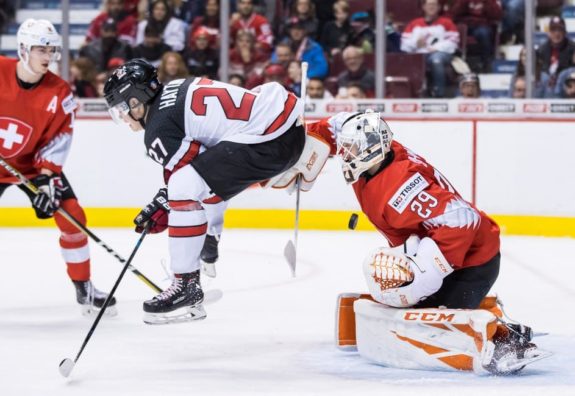
With five returning players from last year’s tournament and quite a number of top prospects for the 2020 Draft on the roster, there’s no doubt that Team Canada will look to dominate the tournament once again. This team is going to be extremely entertaining to watch.
Goaltenders
Nico Daws (Guelph Storm), Joel Hofer (Portland Winterhawks), Olivier Rodrigue (Moncton Wildcats)
Canada is bringing along three goalies this time around; there hasn’t been a clear cut number-one option for Canada. It’s essentially a three-person battle for the job.
The obvious choice would be Olivier Rodrigue of the Moncton Wildcats in the Quebec Major Junior Hockey League. He’s represented Canada previously, winning gold at the 2017 Ivan Hlinka Memorial Cup. His international resume is impressive but his numbers in junior are average, which hasn’t made him a runaway for the starting job just yet.
Guelph Storm goalie Nico Daws and Joel Hofer of the Portland Winterhawks had impressive camps for their first time representing Canada internationally. Both goalies are the top netminders in their respective leagues and each has a case to be the starter for Canada. Daws, who was an unknown heading into camp, leads the Ontario League with a 2.06 goals against average (GAA) and a .939 save percentage (SV%), while Hofer is first in GAA average with 1.81 and second with a .937 SV%.
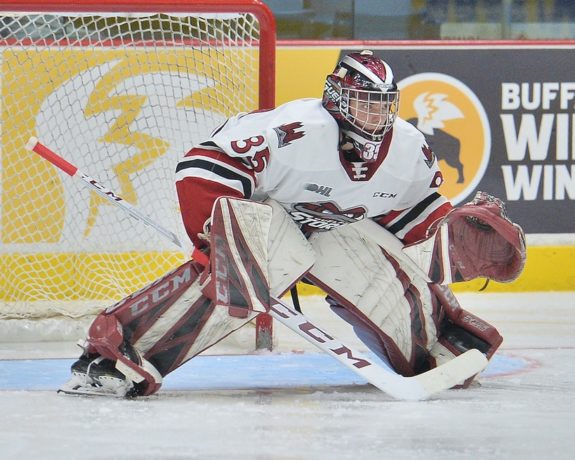
It’s anyone’s game. Usually, Canada has already established their starter well in advance. With the play of Daws and Hofer however, it makes things a little more interesting. This could be reminiscent of 2008 where Jonathan Bernier was supposed to be the starter but was overtaken by Steve Mason who went on to become the top goalie in the tournament. Could we see the same thing happen this year where Rodrigue is the clear favourite and either Daws or Hofer take over? Canada has three solid options, but they have to pick one to be their go-to guy in net.
Defensemen
Calen Addison (Lethbridge Hurricanes), Kevin Bahl (Ottawa 67’s), Jacob Bernard-Docker (University of North Dakota), Bowen Byram (Vancouver Giants), Jamie Drysdale (Erie Otters), Jared McIsaac (Halifax Mooseheads), Ty Smith (Spokane Chiefs)
Team Canada’s blue line is a great mix of strong puck-moving defenders that have speed and the ability to provide strong coverage in their own end. With their ability to move the puck up in transition and join in on the rush, there is no doubt that this will be one of their strengths heading into the tournament.
Canada’s defence will rely on returnees Ty Smith and Jared McIsaac who are seen as the top pairing for Canada. Smith’s strong offensive vision and puck-moving abilities, as well as McIsaac’s presence as a two-way defender, complement each other and will serve as a perfect balance on this pairing. Smith is looking to be one of Canada’s top power-play quarterback while McIsaac will look to use his defensive play as an asset on the team’s penalty kill.
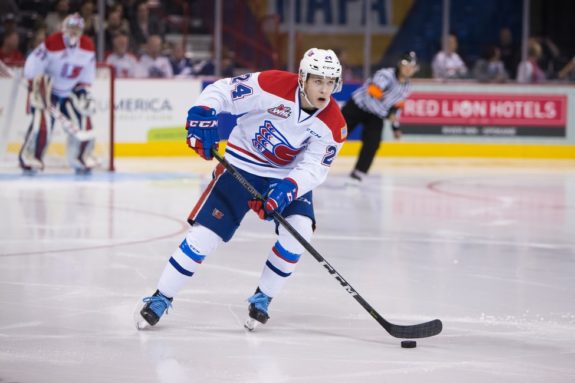
Colorado Avalanche 2019 first-round pick Bowen Byram will be a great asset with his ability to jump into the play and provide a great scoring touch. Adding Calen Addison to the mix should be an exciting pairing where both defenders are offensive-minded. The pairing looked great in their first pre-tournament game against Switzerland, where Byram scored a goal.
However, the main focus will be on potential top-10 pick in the 2020 draft, Jamie Drysdale. Drysdale was a question mark coming into camp as a 17-year-old, draft-eligible player. But after his performance in selection camp and in his first pre-tournament game, Drysdale belongs on this team. His patience with and without the puck is beyond exemplary and his vision to know when to jump into the play is by far the best on the team. Assistant coach Andre Tourigny even went so far as to call him “a genius” when he’s on the ice. While he’s the seventh defenseman, Drysdale will be a big part of this team despite his rank and could see more ice time if he continues to perform well.
Forwards
Quinton Byfield (Sudbury Wolves), Dylan Cozens (Lethbridge), Ty Dellandrea (Flint Firebirds), Aidan Dudas (Owen Sound Attack), Nolan Foote (Kelowna Rockets), Liam Foudy (London Knights), Barrett Hayton (Arizona Coyotes), Alexis Lafreniere (Rimouski Oceanic), Raphael Lavoie (Halifax), Connor McMichael (London), Dawson Mercer (Drummondville Voltigeurs), Akil Thomas (Niagara IceDogs), Joe Veleno (Grand Rapids Griffins)
While Canada has strong offensive weapons like Dylan Cozens and Nolan Foote, everyone’s eyes will be on the top two picks in the 2020 NHL Entry Draft.
Alexis Lafreniere, the projected first overall, is expected to put on a clinic at this year’s tournament. The offensive powerhouse for the Rimouski Oceanic has 70 points in 32 games. His speed, hands and skill are at an elite level and should turn the heads of scouts and viewers watching the tournament.
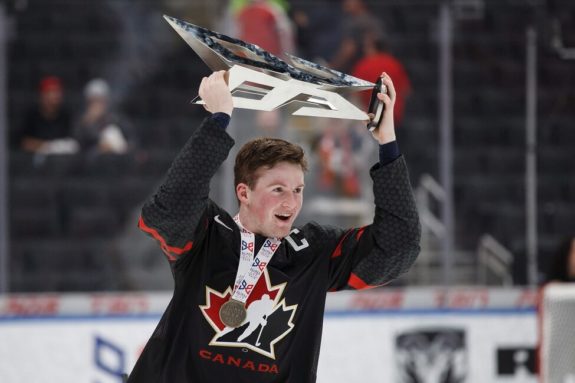
Quinton Byfield, the projected second-overall pick, will look to do the same. Byfield’s size is his greatest asset, as well as his shot. He was a key contributor for Canada at the Hlinka Gretzky Cup this past summer and is looking to replicate his offensive presence in a tournament with players a year or two older. Despite the age difference, Byfield will be able to hold his own and will be able to produce upfront.
Like McIssac and Smith providing the veteran leadership on defence, Canada was extremely lucky to have Barrett Hayton and Joe Veleno to lead the offense along with Lafreniere. Hayton recorded four assists in five games last year for Canada and much like everyone else, the fact that their tournament ended early still stings. He hopes that he can use that experience in this year’s tournament.
Veleno is looking to do the same after being on loan from Grand Rapids. While Hayton didn’t see a whole lot of playing time at the NHL level, Veleno got a lot of experience in the American Hockey League and will use that to his advantage.
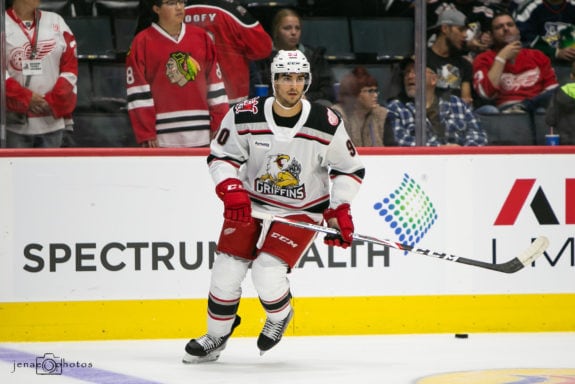
With both on hand as returning players after only having one player last year, it will help to have more than one player to turn to for leadership.
While a lot of the focus will be on the offensive presence of the top six, the depth players shouldn’t be overlooked. The speed on the line of Aidan Dudas- Ty Dellandrea- Liam Foudy was on full display during their game against Switzerland, while Connor McMichael and Akil Thomas showed their ability to get in on the forecheck and locate the puck. Dawson Mercer, who was a bubble player heading into camp, flew under the radar and has battled to earn a spot during the process and could be a Tyler Steenburgen type of player from two years ago.
Like the defence, the forward group is extremely deep with talent and might be the best heading into the tournament. While the majority of the offense will be carried by players like Lafreniere, Byfield, Hayton and Cozens, the depth will also play its part to provide a balanced attack.
Bottom Line
As a whole, Team Canada’s depth up front and on the back end is it’s greatest strength heading into the tournament. Everyone on the team provides a skill set that Mark and Dale Hunter wanted. From the multiple puck-moving defensemen to the many scoring threats at the forward position, Team Canada will no doubt be one of the toughest teams to play against this year.
All the 2020 World Junior Championship Team Information:
Canada — Team Preview — Roster
Czech Republic — Team Preview — Roster
Finland — Team Preview — Roster
Germany — Team Preview — Roster
Kazakhstan — Team Preview — Roster
Russia — Team Preview — Roster
Slovakia — Team Preview — Roster
Sweden — Team Preview — Roster
Switzerland — Team Preview — Roster
USA — Team Preview — Roster
Selection Camp Invites by NHL Team